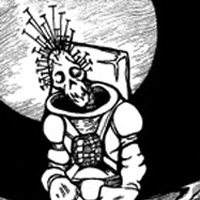 The Year in Movies
The Year in Movies
by Everett Stillwell
translated by Adam Haynes
When I found 1997 wandering through the woods of Northern Maine, she looked chilled and distracted, so I took her back to my cabin for a hot toddy or two, and pretty soon had her naked and spread out on the bearskin in front of my fireplace.
She was covered with gloriously colorful tattoos. One in particular caught my eye. It was on the back of her left shoulder and resembled a wing, but I was sure there was more to it than that. I asked her to explain it to me.
“It’s a story, Everett,” she said, “that starts with my sister, 1989, when one of the most relevant films of its time was released. It was called Say Anything (known in more exclusive circles as Jennifer’s Favorite), and was the first solo effort by kid genius Cameron Crowe. Essentially an intelligent reworking of The Graduate (the framework of the story is changed from matriarchal to patriarchal), the film correctly pointed out the emergence of a brand new generation.
 “If the film had any message it was this: You are holding the reins of culture now, the future is up to you. In narrative terms, the film combined almost every non-violent lowbrow genre from the eighties and reworked them all into something that was more about storytelling than being flashy or reactive.
“If the film had any message it was this: You are holding the reins of culture now, the future is up to you. In narrative terms, the film combined almost every non-violent lowbrow genre from the eighties and reworked them all into something that was more about storytelling than being flashy or reactive.
“Unfortunately the great promise of freedom and control for the new generation was almost immediately turned into just one more commodity: the new generation paid to watch as it sold its own culture away and then paid again to help advertise its objectification in various logos pasted over clothes posters, and then finally popcorn bags.
“Bloated and burned out, things ran to a halt. It was around this time that Cameron Crowe came out with Jerry Maguire. It was obvious by now that grunge had never actually existed (making his early nineties film Singles unfortunately part of the problem), so on this third effort, Crowe went back into the ’80s mentality, because even though it was shallow and corrupt, it still made more sense than what was going on now. Viva Jerry. It proved to be a smart move on his part, for once again, he created a moving film with developed characters and reclaimed his narrative style that was story once again. Jerry Maguire might be a step back, but with it once again comes hope for humanity.
 “Cameron wasn’t alone in this time-traveling cure; his leading man of Say Anything, the poster child for the new generation, John Cusack, also went back in time in 1997, back to the world of eighties high school (where he got his start in such features as Class, Sixteen Candles, Better Off Dead, and others), with Grosse Pointe Blank. Only now, Cusack was acknowledging his new poster boy status, a hardened borderline sociopath. Like Jerry Maguire, Grosse Pointe Blank proved our need to reinvestigate our cultural roots. But Grosse Pointe also took things a step further by reminding us that even if lost love can be reclaimed, the same cannot be said of innocence.”
“Cameron wasn’t alone in this time-traveling cure; his leading man of Say Anything, the poster child for the new generation, John Cusack, also went back in time in 1997, back to the world of eighties high school (where he got his start in such features as Class, Sixteen Candles, Better Off Dead, and others), with Grosse Pointe Blank. Only now, Cusack was acknowledging his new poster boy status, a hardened borderline sociopath. Like Jerry Maguire, Grosse Pointe Blank proved our need to reinvestigate our cultural roots. But Grosse Pointe also took things a step further by reminding us that even if lost love can be reclaimed, the same cannot be said of innocence.”
All that, in such a little wing… But I wasn’t the least bit surprised. I studied her for a second while I had some more of my whiskey with lemon drop tea. “So that’s what you’re about, you’re full of movies.”
“Well, I’m not full of stars, if that’s what you mean… Movies are the roots of my existence,” she said. “They are the physical and metaphysical. Just like you suspected. Just like you always hoped.” “My point,” I said, yanking off my clothes and laying myself down next to her so that our skin was pressed together and the odor of her excited sweat filled my nostrils. “My point is that I want to get inside you. I want to understand what’s inside. I want to feel it as well as see it.” I slid my hand up and down her thigh, reveling in the goose bumps that sprouted forth.
“There’s a lot in me – both good and bad. You can’t understand the good until you see the bad. Can you deal with that?”
“Baby,” I breathed back at her, “I’m the fucking head priest in the church of voyeurism. Give it to me, give it all to me!”
 So she put me on my back and squatted on top me, then squeezed and squeezed until my stomach and chest were covered with what can only be described as a serious amount of shit. “What do you make of that?” she asked, getting off the couch and heading into the kitchen for more booze.
So she put me on my back and squatted on top me, then squeezed and squeezed until my stomach and chest were covered with what can only be described as a serious amount of shit. “What do you make of that?” she asked, getting off the couch and heading into the kitchen for more booze.
Most of it was what I was used to: Metro, Turbulence, The Lost World, English Patient, Hoodlums, Blood and Wine, My Best Friend’s Wedding, Double Trouble, Portrait of a Lady, Men In Black , Traveler, The Postman, Kissed.
But… as I sorted through the sloppy mess on top of me, I realized a good deal of it wasn’t even excrement at all. It was bits and pieces of what must have been some sort of tumor. Con Air, Hugo Pool, The Pillow Book, A Life Less Ordinary, Air Force One, Rough Magic, Face/Off, Kicked in the Head, Jackie Brown, Alien Resurrection, Box Of Moonlight, Batman and Robin, Nowhere. These films stunk of a disease that was different than just the ordinary “bad movie” (which seeks not to be infectious, but forgotten). More importantly these films stunk of disease that was dead, gone, no longer around. I sniffed again at the putrid odor that wafted off these slimy feces, and then looked at 1997, who was walking toward me with two new drinks, and one of my towels.
 “Hipness,” I said wiping myself clean with the towel. She sat down beside me and nodded her head. “Do you know much about it?”
“Hipness,” I said wiping myself clean with the towel. She sat down beside me and nodded her head. “Do you know much about it?”
“Do I ever!” I laughed, then continued, “Hipness is about trying to get away with it to the point of transcendence. It’s about being so with it that you become above it and removed. Who in God’s name would want this? The problem with hipness is that once we have gotten away with it, and transcended, we find we haven’t gotten anywhere at all. We find hipness is nothing more than a virus of the psyche… Once we have transcended using hipness, our only option becomes to keep using hipness, feeding on our own meaninglessness in order to survive. This is not an option. This is creative death.”
“To put it more succinctly,” I continued, running my fingers over one her flushed, erect nipples, “hipness is a virus. It originated in France in the early sixties, though it is not clear at what point it crossed over. It could not find a proper cultural host until roughly 1991, when late ’80s cynicism went into commercially viable commodification. The roots of cinematic ethic hadn’t been more vulnerable since the early ’30s and the virus launched a mighty attack with a verve and arrogance that is the hallmark of such organisms.”
 She laughed. “I had no idea I was in the presence of an expert.”
She laughed. “I had no idea I was in the presence of an expert.”
This was no time for me to feign humility. “Before I went mad,” I said, “I wrote a book called A Genealogy of Hipness. But tell me, I’m fascinated, how did it finally die?”
“Ironically enough, it was killed internally by one of its own mutations…”
Instantly I knew what she was talking about. I got up and went over to the towel I’d wiped myself with and took a good whiff of some of the more prominent bits of tumor. Sure enough, my guess was proved correct. I went back and lay next to 1997, who promptly started sucking on my left thumb. “U-Turn,” I muttered. She nodded her head and continued her sucking…
You can always tell when even Oliver Stone knows he’s made a hip movie, because in all the press hype preceding the release he repeatedly rants and raves like some paranoid apostle, of how when he was making the movie, he was just trying to have fun, and all the critics will crucify him because they won’t get it, they’ll take it too seriously.
 His contribution as director to the film body of 1997, U-Turn, clearly proves that his ongoing confusion over the differences between style and substance, between bullshit and beatification, has finally reached such a state of excess that it has canceled hipness itself out.
His contribution as director to the film body of 1997, U-Turn, clearly proves that his ongoing confusion over the differences between style and substance, between bullshit and beatification, has finally reached such a state of excess that it has canceled hipness itself out.
U-Turn is worse than bad – it’s boring, and not even insipidly so… and to such an extreme that there can no longer be any shadow of a doubt that hip just ain’t what it’s about no more.
With the purity of a future saint, Stone has unintentionally ripped the armor off the disease: U-Turn is naked hipness, finally revealed as nothing more than a petty post-modern pose for creative impotence: not only are the citizens aware that the emperor is not wearing any clothes, but they also see he’s got a tiny little dick…
Back to situation with 1997. Suddenly we were all over each other, groping, licking, ripping jagged lines in each other’s flesh with our fingernails.
Her skin was getting hot to the touch and I could feel the wetness dripping from between her legs. Proud and erect, I entered 1997 and let me tell you, even though part of me knew I’d been there before, it still felt better than anything else, especially since all the bad shit was out of her system.
“Ohhh Everett!” She arched her back and by the way she was moaning, I knew she was about to come. “Can you feel me, can you feel my body???… CAN YOU FEEL WHAT CONSTITUTES MY FLESH???”
 I could. It was made of all the best movies and I felt myself coming all over them like some magnificent porno legend on “E.”
I could. It was made of all the best movies and I felt myself coming all over them like some magnificent porno legend on “E.”
Spraying my love juice all over them. All over Anaconda, The Fifth Element, Volcano, Mimic, Event Horizon, Breakdown, Tomorrow Never Dies, The Jackal, Austin Powers, Conspiracy Theory, The Full Monty, and The Man Who Knew Too Little – all those great goo goo treats which proved that general cinema is going back to older formulas which, if redundant, at least work better than now dead Hip (just as her tattoo described).
1997 began to scream in chocked echoes of polyester-based celluloid, and I experienced a moment of clarity that only comes with really nice sphincter pumping: I saw past all the great films of her flesh to the hormonal movie which had laid the groundwork, had helped bridge film away from Hip (just as U-Turn was gearing up to take it out once and for all), and was responsible for her glorious identity.
Voila: There was Scream!
Scream reintroduced the goo goo stuff with its sugar coating of ersatz hipness (very tricky this), to a national audience desperate for anything new, even if it was old. The movie most importantly showed that successful genre filmmaking works not because of the exploitation involved, but because of intelligent storytelling.
 Standing there next to Scream was what had to be what was making 1997 writhe and spasm on top of me with such electric pleasure: Starship Troopers.
Standing there next to Scream was what had to be what was making 1997 writhe and spasm on top of me with such electric pleasure: Starship Troopers.
I have to admit that in the past, Paul Verhoeven has made some movies which have thrilled me, most notably The Fourth Man and Basic Instinct. More often than not however, his tacky sets and violently extreme sense of humor have left me cold (though his movies have never attempted any sort of preventions which would cause them to stricken with Hipness).
In Starship Troopers, everything comes together and the balance created borders on the near-perfect. The sexuality, violence, character development, and old school boom boom IMPACT make this, without a doubt, the most well-constructed goo goo film of 1997. The underlying artistic message, an engrossing and highly creative investigation of the sort of fascism which swept over Germany and carried it at breakneck speed into WW2, make this one of the most artistically satisfying films of the year as well. It is the combination of pure art and pure genre storytelling which make Starship Troopers the best product film put out in recent history, and it stands a monumental reminder to Hollywood of what it could and should be turning out if it was interested in ever reaching its fullest potential.
“Do you love me?” 1997 gasped, her upper body shuddering on top of me, dripping with sweat. “Of course I do,” I groaned.
 “But you’ve only seen my body, I want you to love me for mind as well.” She bent down and began kissing me passionately on the lips, much more passionately than before.
“But you’ve only seen my body, I want you to love me for mind as well.” She bent down and began kissing me passionately on the lips, much more passionately than before.
I felt a dreamy suction and sense of rising, and then I was there, I was in her mind, and it was as beautiful as her body had been lascivious.
It was like a garden and all around me were these beautiful statues which glowed and came to life as I walked by them. At the beginning there was Ulee’s Gold and Sling Blade, which were closest to her body for they were the mind films whic d chosen to go the route of Hollywood and fall back to preexisting formulas for their storytelling, but as I got further along there were films which went into the other direction and pushed and played with the current limits of narrative: Freeway, She’s So Lovely, Career Girls, Afterglow, Two Girls and a Guy, The End Of Violence, all blazed away with the glory that comes from a progressive passion interested in telling stories as effectively as possible, sparring all hip-inducing self-indulgence.
 This is a style of filmmaking which moves beyond preconceived formulas while at the same time not disregarding them or their worth. Get it? Vertletzlich Leidenshaft. Non Reactivity.
This is a style of filmmaking which moves beyond preconceived formulas while at the same time not disregarding them or their worth. Get it? Vertletzlich Leidenshaft. Non Reactivity.
You could call this a new cinematic movement, but to do so would be to miss the point because the term “movement” kills individuality, and that is exactly what these films are all about. They are about talent, and creativity which will never be made static.
I staggered around this garden of her mind and I felt my own head expanding and then I was back in my body again and we were still kissing, but it was greater than before because now that I had experienced her mind and body I could see the intangible which was her soul, which existed at the center of this celluloid garden, and was causing her to burn with a dark, yet white burning brightness which consumed the both of us. And as I squinted at it more closely I saw that her soul was conceived of two parts… Lost Highway and Crash.
 The soul is always composed of that which is so original and unique it overcomes the normal bonds of bourgeois aesthetic, as well as the space-time continuum. The soul is the seed, the simple great beginning. Just like every movie made today echoes the essence of Videodrome and Blue Velvet, so will the movies of the future emulate these two beautiful masterworks.
The soul is always composed of that which is so original and unique it overcomes the normal bonds of bourgeois aesthetic, as well as the space-time continuum. The soul is the seed, the simple great beginning. Just like every movie made today echoes the essence of Videodrome and Blue Velvet, so will the movies of the future emulate these two beautiful masterworks.
Suddenly I felt very naked and very alone. I asked out loud where 1997 had gone and an internal response told me 1997 hadn’t gone, that she was still around, everywhere. It dawned on me what was happening, and my heart stirred and felt young. I let the fires consume me, even though I knew that not even I, Everett Stillwell, could truly understand the genius of Lynch and Cronenberg. Despite this I was dancing. Everything in the garden was on fire now and I continued to dance, carefree.
1998 was about to be born.



